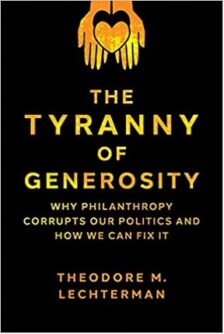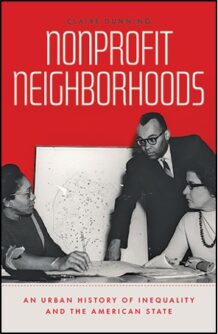A mid-year collection of interesting and insightful passages.
Justifying philanthropic privileges
“Philanthropy that comes with good intentions, careful strategy, and impressive results can often flout and even corrode another crucial value: the value of democracy.
…
“Using tax privileges, matching grants, special restrictions, and unique legal devices, the modern state gives the practice of philanthropy its particular strength and texture. Which if any of these regulatory strategies can be justified requires careful analysis and evaluation.”
— Theodore M. Lechterman, The Tyranny of Generosity: Why Philanthropy Corrupts Our Politics and How We Can Fix It, reviewed in “Philanthropy’s corruption of politics, and vice versa,” January 12, 2022
Expensive defensive
Conservative businessmen saw unfair regulation-enforcing “government officials as the leading edge of communist tyranny or, in Lewis Powell’s words, of ‘state socialism.’
“The anger among these proprietary capitalists at government and the New Deal order gave the Reagan revolution its radical edge. Its members never ceased being inspired by Barry Goldwater’s declaration in his 1964 acceptance speech that ‘extremism in defense of liberty is no vice.’ No expense was to be spared in mounting this defense, which is why the Kochs, the Coorses, and their ilk were investing large sums from their personal fortunes into foundations, PACs, and candidates that, in their eyes, might save their enterprises and the American system of freedom that had made them possible.”
— Gary Gerstle, The Rise and Fall of the Neoliberal Order: America and the World in the Free Market Era, reviewed in“Philanthropy in The Rise and Fall of the Neoliberal Order,” May 19, 2022
In the opposition
“Anti-Marxist liberals now find themselves in much the same situation that has characterized conservatives, nationalists, and Christians for years. They are in the opposition. This means that a few brave liberals are now waging war on the very institutions they so recently controlled, trying to build up alternative educational and media platforms in the shadow of the prestigious, wealthy, powerful institutions they have lost. Meanwhile, others continue to work in the mainstream media, universities, tech companies, philanthropies, and government bureaucracy, learning to keep their liberalism to themselves and to let their colleagues believe that they too are Marxists—just as many conservatives learned long ago how to keep their conservatism to themselves and let their colleagues believe they are liberal.”
— Yoram Hazony, Conservatism: A Rediscovery, reviewed in “Opposition ‘anti-Marxist liberals’ in Yoram Hazony’s Conservatism,” June 2, 2022
Politics, proposals, and power differentials
“Though as an administrative tool, grants are, in theory, ideologically and politically neutral and broker partnership arrangements between entities with shared goals, they do not put parties on equal footing. Neighborhood nonprofits’ choice to apply for government funding or enter into a partnership with government is not equivalent to government bureaucrats’ choice to select or deny the proposal. The element of choice for the grant maker is what defines grantmaking and, as a result, renders grants a poor vehicle for delivering rights. This might not be a problem for a philanthropic foundation, itself a kind of private corporation, but ought to prompt questions—if not concerns—when the state increasingly governed through grantmaking. Power differentials in public grantmaking became one of its defining features; they helped make the governing tool popular and productive but also prevented it from achieving its highest democratic ideals.”
— Claire Dunning, Nonprofit Neighborhoods: An Urban History of Inequality and the American State, reviewed in “Differences, and the risk of similarities, between government and private grantmaking,” June 14, 2022
Excessive concentration of power and wealth
“A specific tax scale should ideally be applied to endowments held by foundations and other nonprofit organizations as well, in order to avoid an excessive concentration of power within a small number of entities and to enable less wealthy entities to develop.”
— Thomas Piketty, A Brief History of Equality, reviewed in “Thomas Piketty proposes specific tax scale for nonprofit endowments,” June 30, 2022






